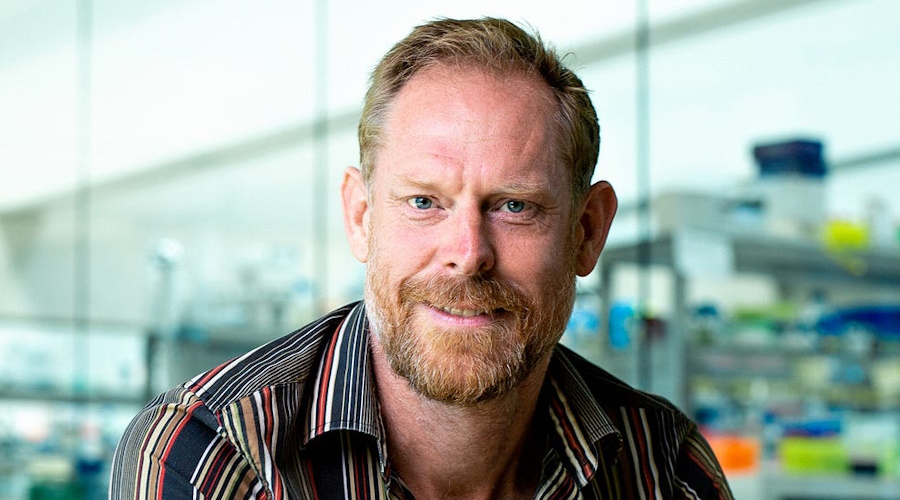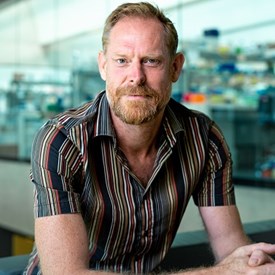Professor Giles Oldroyd FRS share his reflections on 50 years of Pride in the UK, along with a look to the future.

This year London Pride turns 50. As a member of the LGBTQ+ community I feel lucky to have been born during the first year of Pride in the UK: throughout my life people have been campaigning for equal rights for members of my community. Over the 50 years of Pride I have experienced a transformation in how society treats LGBTQ+ people. Growing up LGBTQ+ was not easy. During my teenage years I experienced a daily threat of physical and mental abuse that targeted anyone who identified as LGBTQ+. Such bullying undermined my self-confidence and kept me repressing my true identity. Coming out as a gay man in my twenties was a liberating experience, coming out as non-binary is a journey I am only just beginning. I consider myself queer: to me, it describes the non-conformity it means to be both gay and non-binary.
Being queer and being a scientist are the two most important aspects of my identity. I cannot be one and not the other. Being queer has meant being different my entire life. I have had to break through the strictures of society’s expectations for how one should live one’s life. It takes bravery to be queer, to stand up for who you are, even when it is derided. Being queer has made me braver, more determined, and more compassionate. I believe these are powerful attributes for a scientist.
Being a good scientist often requires taking risks, thinking outside the box, being creative. I know that I am most creative when I am in environments where I feel safe to be myself. Places where I am able to express my queer identity are also the places where I thrive as a scientist. Like many members of my community I remain burdened by the shame of growing up queer. I come to work with baggage because of my life experiences. I work hard to embrace pride in my identity, but it’s a journey, coming out is not a panacea to decades of oppression. I believe the LGBTQ+ community has much to offer to society, but please understand that our lives have rarely been an easy journey and we often carry the scars.
Supporting diversity means embracing difference: recognising the diverse paths each member of that community has walked and appreciating that vulnerability is an intrinsic part of being human. It takes leadership to create a culture of diversity, an environment where every member of that community can be authentic.
Unfortunately I have worked in environments that oppress diversity. Such environments value self-confident individuals who aggressively promote their own worth. In such an environment I found myself always fighting to be heard, to be valued, to be appreciated. I lost track of how many times I heard that you needed to have a thick skin to survive. As a queer person with the baggage of shame, this environment was toxic. I was bullied by my seniors, with the worst occurring at the time of my greatest success. To quote Täuber and Mahmoudi: “bullies spring into action when their targets become too successful for their liking — and thus viable competition.” Years of harassment left my mental health in tatters and looking to leave science. Thankfully I moved to an organisation that took diversity seriously, somewhere that gave me the space to recover. I know my experiences are not unique and are all too frequently those of women and minorities working in science. What frustrates me most is that I see the individuals and organisations who perpetrate the worst abuses receiving accolades for supporting minorities. It has made me extremely sceptical of such awards - currently these can be rainbow washes covering some of the worst atrocities.
In this month that celebrates 50 years of Pride, I will be inducted into the Fellowship of the Royal Society. I feel great pride to be included in this fellowship because of my contributions to plant science. But I also feel great pride to join this fellowship as an openly queer person. I have seen huge changes in society that have happened in these 50 years of Pride: I have been legally married to my husband for 15 years and have not experienced harassment outside my professional life for 30 years. But my experiences as a queer scientist are much less progressive. If we want to see change, I suggest it needs to start here at the Royal Society, the home of British science. Let’s ask the incoming fellows to voluntarily disclose their sexual and gender identities, so we know the LGBTQ+ members of our community, and let’s join the many organisations that already march in Pride, showing their commitment and determination to support and encourage diversity in their organisations. Pride is about being authentically yourself and that is empowering and valuable however you identify.

